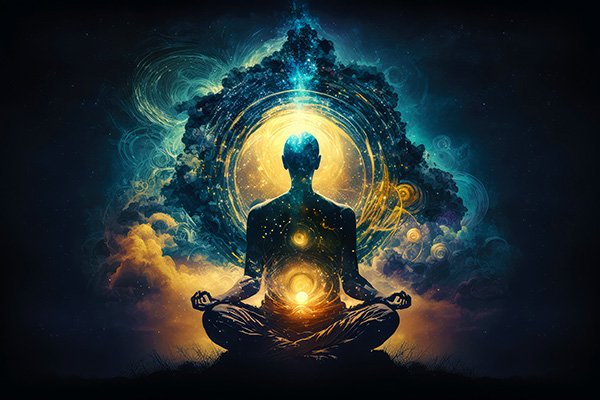ego
How Mars Retrograde Impacts Your Love Life
 From tonight until February 23, 2025, the astrological climate will be dominated by Mars Retrograde, a time when the assertive planet of passion, drive, and action appears to be moving backwards across the sky.
From tonight until February 23, 2025, the astrological climate will be dominated by Mars Retrograde, a time when the assertive planet of passion, drive, and action appears to be moving backwards across the sky.
The Mars retrograde cycle occurs approximately every two years and creates a celestial atmosphere that challenges us to slow down, reflect, and reevaluate how we navigate the aspect of our lives impacted by a retreating Mars, especially love and relationships.
This time Mars will reverse through the bold sign of Leo until January 3, 2025, before retreating further into the emotional waters of Cancer until February 23. The shift from Leo to Cancer will bring a dynamic shift in how we experience passion, intimacy, and connection.
Mars retrograde typically signals a period of inward focus. The fiery, action-oriented energy of Mars is muted, forcing us to rethink how we assert ourselves and pursue our desires.
When Mars is in retrograde, direct action often feels less effective. Misunderstandings may arise, frustrations may simmer, and the usual outlets for passion or conflict resolution may not work as intended.
In the context of relationships, Mars retrograde tends to bring old wounds and unresolved issues to the surface. The next 79 days will be a time when hidden frustrations or imbalances within partnerships come to the surface. It’s not uncommon to experience tension during this time, as retrograde forces us to confront aspects of our love lives that we may have avoided.
The Self-Affirming Power Of Saying No
 Are you the kind of person who has a hard time saying “no,” even when your heart isn’t in it?
Are you the kind of person who has a hard time saying “no,” even when your heart isn’t in it?
Maybe you’re afraid of disappointing others, afraid they’ll distance themselves, or afraid they’ll stop liking you if you say no. Maybe your introverted side just wants to be liked and accepted by everyone, so you agree to things – even if it drains you.
I’ve experienced this myself and seen it happen to many people who come to me and ask, “How can I say no without feeling guilty?” or “If I don’t say yes, will I lose my connection with this person?
Saying “yes” out of fear, guilt, or obligation may be the easy way out in many situations, but it usually comes at a high cost to your personal and spiritual well-being.
Let’s acknowledge something important: You are enough just the way you are, and you are worthy of peace, joy and happiness. If someone truly values you, they’ll respect your boundaries, even if it means saying “no” once in a while.
On the other hand, if people cut you off because you set boundaries, they may not have been the healthiest presence in your life to begin with. True friends and meaningful relationships will respect your choices and understand your reasons without demanding constant explanations.
Over time, I’ve seen the toll that over-commitment takes. People who constantly say “yes” often end up feeling drained, overwhelmed, or even resentful. Some develop physical and mental health problems because they feel trapped by the constant need to please others. In some cases, burnout and depression set in, all because saying no felt like an impossible task.
How To Navigate The Sun’s Debilitation In Libra
 The current debilitation of the Sun in Libra is causing challenges and disruptions in various aspects of life. In astrology, “debilitation” refers to a planet being placed in a sign where its qualities are weakened or limited.
The current debilitation of the Sun in Libra is causing challenges and disruptions in various aspects of life. In astrology, “debilitation” refers to a planet being placed in a sign where its qualities are weakened or limited.
When the Sun is debilitated in Libra, the usual energies are diminished according to the qualities of that sign. This astrological event therefore weakens the Sun’s influence in terms of authority, recognition, and personal power. As a result, many of us may experience unexpected changes in our careers, relationships, and personal lives until November 15th.
In Vedic astrology, each planet has a sign where its natural qualities are considered at their weakest, called a “debilitated” or “neecha” state. The Sun, which symbolizes our core self, vitality, ego, and sense of purpose, represents the energies of confidence and assertiveness. In Libra, however, the Sun’s qualities are tempered, tending toward compromise, diplomacy, and harmony.
The placement encourages us to prioritize cooperation over independence, as Libra’s emphasis on relationships, balance, and the perspective of others mutes the Sun’s usual assertive radiance. As a result, we feel more compelled to seek balance and harmony over confidence and assertiveness, and less inclined to take center stage or make bold, self-directed moves. Instead, there’s a focus on harmonizing with others and considering their points of view, which can shift the typical expression of personal power.
The debilitation of the Sun in Libra can be both empowering and challenging, requiring us to balance our individual goals with our relationships, and to examine where we may be overreaching for the sake of peace. While the Sun’s weakened state can feel limiting, it also offers a time to consider how cooperation and mutual respect can enhance our lives and strengthen our purpose from a place of unity rather than individualism.
Always Choose Your Gut Over Your Heart And Mind
 We all have a higher purpose in this lifetime, and yet many never awaken to it, much less achieve it, because their ego has become more prominent in their lives than their higher self.
We all have a higher purpose in this lifetime, and yet many never awaken to it, much less achieve it, because their ego has become more prominent in their lives than their higher self.
How do you know if what you are doing is for your highest good? How do you make sure you are aligned with your soul purpose? How do you know if what you want out of life is based on your worldly desires instead of your spiritual mission in this lifetime?
Well, you listen to your inner guidance. You trust your intuition. You follow your gut.
When you were born, a deep-seated dream was placed within you. As children we are often more in touch with our true calling or purpose, but many of us lose that awareness as we grow older. Unfortunately, it has been buried by the expectations of society and the many distractions of the material world.
Often our parents, peers, teachers, and mentors play a significant role in this process of shutting down our spiritual awareness. Has anyone ever laughed at you when you told them what you wanted to do or be? Did someone say, “Go back and think about that because it will never happen”? Each of us has a different story as to why we do or don’t achieve our dreams in life.
Today is the day to decide, “I will achieve my dreams as long as they come from the spirit and are for my highest good.” It is time to look at your dreams for your life from a deeper perspective.
The Divine Spirit Beings Who Guide Our Life Journey
 We are all here for two important spiritual reasons – to serve and to learn. Each of us has a unique calling to fulfill and lessons to learn for karmic growth and soul evolution.
We are all here for two important spiritual reasons – to serve and to learn. Each of us has a unique calling to fulfill and lessons to learn for karmic growth and soul evolution.
The contributions we are meant to make and the lessons we are meant to learn are unique to each of us, and it’s up to us to uncover these aspects of our soul plan as we move through life.
Our guides and angels are a powerful resource in this process, yet they often go unnoticed or even unrecognized. These spirit beings work quietly behind the scenes to provide guidance, support, and protection as we navigate our life journey.
Their primary role is to guide us in fulfilling our mission to be of service, learn our karmic lessons, and to grow. If we don’t fulfill our purpose or learn our lessons, it will keep reappearing in our lives in different ways until we recognize, resolve, accept or own it.
Our guides and angels are always behind the scenes – patiently waiting for us to seek their wisdom and allow them to assist us in fulfilling our soul plan. By connecting with our spirit team, we open ourselves to personal growth and spiritual evolution.
Our spirit and angel guides are benevolent, non-physical beings who serve as intermediaries between the physical and spiritual worlds. Each of us has guides who are assigned to help us, whether we acknowledge their presence or not.
The Life Lessons We Learn From Children
 We can learn so much from children if we really pay attention and make the effort to see things from their perspective. Children embody a purity and wisdom that most adults have lost touch with in the complexities of daily life.
We can learn so much from children if we really pay attention and make the effort to see things from their perspective. Children embody a purity and wisdom that most adults have lost touch with in the complexities of daily life.
Many women in my age group, known as the “baby boomers,” were so busy trying to have a career and a family. We believed we could do it all, but in the process we missed many of the little things our children had to teach us. I was guilty of that.
But now that I have grandchildren in my life and have had the opportunity to take the time to see things differently, I have learned many profound lessons and insights from them over the years.
In their early years, children are still deeply connected to their spiritual origins and carry with them a high level of soul awareness that has not yet been clouded by the demands of physical life and the challenges of human existence.
This active spiritual awareness allows them to move through the world with an openness and purity that adults often struggle to maintain. Unencumbered by societal expectations, ego-driven desires, or fear of judgment, they are able to express love, joy, and creativity in their most authentic form.
Because they haven’t yet been conditioned by the limitations and constraints of the material world, children serve as powerful teachers, offering us glimpses of the spiritual truths that are easily forgotten in the hustle and bustle of adult life. They remind us of the infinite potential of our own souls and inspire us to reconnect with the deeper, more meaningful aspects of our being.
